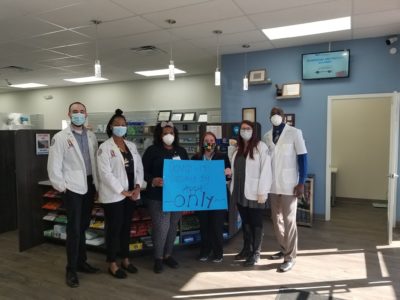Justify that nap, aspirin preventing miscarriages, backwards on buprenorphine, and more
27 Jan 2021
Posted by Andrew Kantor
States may be underreporting Covid deaths
Southern states seem to be under-counting their Covid-19 deaths — at least according to a new study out of Boston University. The gist: After analyzing deaths in 787 U.S. counties (including 50 in Georgia), the study found that there were a lot of “excess deaths” from February through October 2020, and…
The researchers estimated that 31 percent of excess deaths attributable to the COVID-19 pandemic were not reported as COVID on death certificates.
In other words, something caused a jump in deaths in 2020 (compared to other years), but these states say it wasn’t Covid-19. Instead, whatever pre-existing condition* they had was listed as the cause of death.
* “He was hit by a car, but we’ll put his heart condition down as cause of death.”
PCOM students help vaccinate
A virtual high-five to student pharmacists from PCOM — Zach Dykes, Macy Biddulph, Nakoasha Dillard — who volunteered at Suwanee Pharmacy to help coordinate the pharmacy’s Covid-19 clinic this past weekend.

Suwanee Pharmacy’s Covid vaccine team
Flu vaccine: regular or hi-test?
When it comes to the flu vaccine, older folks like to worry about whether they should get the standard flu vaccine (“aIIV3”) or the high-dose version (“HD-IIV3”). Is there a risk of a reaction to one or the other?
Nope — not according to a new study by researchers at Duke, Stanford, and the CDC. When it comes to adverse reactions, either one is good.
“These findings suggest that from a safety standpoint, aIIV3 or HD-IIV3 is an acceptable option to prevent influenza in older adults,” they conclude.
One step forward, one step back
The Biden administration is going to temporarily reopen the HealthCare.gov insurance marketplace to allow people who have lost their coverage to sign up for a plan outside the normal open-enrollment period.
But it’s also considering rolling back a last-minute Trump administration plan that allowed physicians to prescribe buprenorphine for opioid addiction without first getting a day’s training, saying that HHS lacked the authority to issue those guidelines.
An aspirin a day to save a pregnancy?
A miscarriage — or even several — is awful, but it obviously doesn’t mean you can’t have a child. One way to improve your chances of conceiving, Emory epidemiologists confirmed, seems to be a low-dose aspirin regimen.
I say “confirmed” because there was some previous evidence that “preconception-initiated low-dose aspirin was associated with a 10% increase in live births.” But now the data have been more rigorously analyzed. Result:
[R]elative to placebo, low-dose aspirin adherence for 5 of 7 days weekly led to eight more positive pregnancy tests, 15 more live births, and six fewer pregnancy losses for every 100 women in the trial.
There are risks with taking low-dose aspirin regularly, so don’t take or give medical advice from an email newsletter.
A path to better cancer drugs
Some cancer drugs target enzymes known as HDACs — they’re critical to cell division, so if you mess with them in cancer, you can stop it from growing. But HDAC inhibitors (like belinosta, romidepsin, or vorinostat) can have some nasty side effects.
Now those shifty Danes may have figured out a way around that. They’ve determined how those HDACs interact with histones at a molecular level. That means that drugs might be made that, rather than target all 11 HDACs, might be able to target one or two.
Because HDACs affect more than cancer cells, that kind of selective targeting might cut side effects and make the meds more effective.
Sleep on it, baby baby lemme sleep on it
Afternoon naps, say Australian researchers, are good for your brain.
[T]hose who enjoyed a post-lunch kip had significantly higher cognitive performance than the non-nappers. The study also found “afternoon napping was strongly associated with orientation, language function and memory”.
Pro tips: The nap should be between lunch and about 2:00 p.m., and only last about 10 to 20 minutes — not long enough to go into deep sleep.
Caveat: The study only looked at people over 60 who slept about 6-½ hours a night.
Between light and shadow…
In the space between a Covid-19 vaccine and a treatment live … monoclonal antibodies, according to Regeneron. It says that its monoclonal antibody cocktail prevented Covid-19 in people who were exposed to the SARS-CoV-2 virus.
The volunteers were at high risk of infection because they lived in the same household as a Covid-19 patient. Half the patients received a placebo, and the other half received 1.2 grams of casirivimab and imdevimab, Regeneron’s antibodies.
While eight of the 223 patients in the placebo group developed Covid symptoms and tested positive for the virus, none of the 186 patients who received the antibody did.
Today’s Covid facepalm
The more-contagious variants of Covid-19 are starting to spread in the U.S. (the first case of the South African version has appeared), so governors in some states — California, Illinois, Massachusetts, New York — are … lifting restrictions? Health experts are sighing deeply.
“We’re just asking to go backwards by easing restrictions without focusing on achieving herd immunity with vaccination.”


